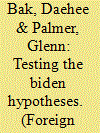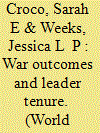| Srl | Item |
| 1 |
ID:
146156


|
|
|
|
|
| Summary/Abstract |
When do states impose sanctions on their rivals? We develop a formal model of domestic power consolidation, threats, escalation, and imposition of sanctions. With complete information, the target regime's consolidation of power determines the result—leaders with stable control can weather sanctions and thus deter their imposition, while vulnerable leaders concede the issue. However, when an imposer is uncertain of a foreign leader's consolidation, vulnerable types have incentive to bluff strength. Foreign powers sometimes respond by imposing sanctions, even though the parties would have resolved the crisis earlier with complete information. We then hypothesize that opponents of newer leaders—particularly in autocracies—are more likely to suffer from this information problem. Employing the Threat and Imposition of Sanctions (TIES) data set and carefully addressing selection problems common to the sanctions literature, we show that sanctioners are indeed more likely to follow through on threats against such leaders.
|
|
|
|
|
|
|
|
|
|
|
|
|
|
|
|
| 2 |
ID:
098252


|
|
|
|
|
| Publication |
2010.
|
| Summary/Abstract |
Senator Joseph R. Biden Jr. predicted that Barack Obama would face an international challenge in his early term by foreign enemies who want to test a young leader's resolve as a chief executive just like John F. Kennedy did in the Cuban missile crisis in 1962. We test this argument using the directed-leader-dyad-period data for both world leaders and the US presidents between 1875 and 2001. We find that old leaders are more likely to be a target of militarized disputes, and even more so during the early term as opposed to Biden's prediction. The impact of tenure on the likelihood of being targeted largely depends on age. We also find that old Republican US presidents are especially vulnerable to foreign challenges early in their term.
|
|
|
|
|
|
|
|
|
|
|
|
|
|
|
|
| 3 |
ID:
149516


|
|
|
|
|
| Summary/Abstract |
A growing body of literature argues that war outcomes affect leaders’ tenure in office. But disagreement persists over how domestic political institutions translate performance in war into leader accountability. Some scholars argue that the tenure of democratic leaders is most sensitive to war outcomes, while others posit that autocratic leaders are more likely to be punished or rewarded for the outcomes of conflicts. The authors argue that existing research fails to take into account two important factors: whether the leader is viewed as culpable for the country's entry into the conflict, and whether the country features domestic institutions that make the leader vulnerable to removal from office, which varies greatly across nondemocracies. After taking leaders’ culpability and vulnerability into account, the authors show that the tenures of culpable, democratic leaders and culpable, vulnerable, nondemocratic leaders are sensitive to war outcomes. By contrast, the tenures of nondemocratic leaders who are less vulnerable to removal are not sensitive to war outcomes, regardless of their culpability.
|
|
|
|
|
|
|
|
|
|
|
|
|
|
|
|